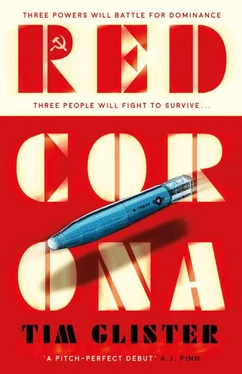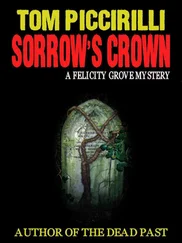She recalibrated the amplifier and receiver to asynchronous code division and sent a basic test signal. It worked. She reset the equipment and encoded a more complex message. She transmitted the signal and, after a split second that felt like a year, the receiver captured it completely intact, with no degradation or corruption.
Valera almost didn’t believe it. She might actually have found a way to talk to the stars. This could change everything. For Russia, for science, for her, and for Ledjo. She allowed herself the briefest moment of celebration before resetting her equipment to send another signal. She needed to prove it wasn’t a fluke. She picked her message, encoded it, and sent it. But as soon as she did the room plunged into darkness.
The power to her lab had been cut. She looked around for a moment, confused. Then her eyes landed on the luminescent hands of the clock that hung above the lab’s door. In her excitement she’d missed the double blare of the siren that had sounded a minute before. It was five o’clock, and the working day in Povenets B was over.
‘They’ll hate you for this,’ Holland had said to Knox the day he’d asked him to become MI5’s own grand inquisitor and mole hunter in his large, wood-panelled office on the fifth floor of Leconfield House.
‘Most of them already do,’ Knox had replied.
Knox knew he didn’t have many friends in the Service. After a decade and a half, he was still an outsider. He didn’t come from the right sort of family and hadn’t gone to the right sort of schools. He was an orphan from the East End who had spent his childhood dodging Blitz bombs instead of learning the classics. He’d never doffed his cap to the great and good, or asked people to do something when he could just tell them, because with Holland’s ever-present support, he’d never had to.
‘I’ve already been told by various quarters that this is all baseless paranoia, sheer McCarthyism, a classic Russian misinformation tactic that we shouldn’t fall for, and generally beneath the Service’s attention,’ Holland said.
‘What do you think?’ Knox asked.
‘Frankly, I hope they’re all correct,’ Holland said. ‘But the onus is on us to prove it one way or the other. We find ourselves in a rather precarious position, caught between two old allies. We can’t afford any missteps.’
‘Only one is still our ally,’ Knox countered.
‘True, but for every person in Whitehall who thinks we should be cosying up even closer to America there’s someone else who wants us building bridges with the Russians,’ Holland said. ‘And if they end up firing nuclear warheads at each other they’ll be flying over our heads.’
Britain’s own nuclear defence development had stalled after the de Havilland Blue Streak missile programme had been cancelled a year earlier. And no rocket with the Union Jack on its side would be shooting for the moon any time soon. This was one of the reasons Pipistrelle was so important – the intelligence it collected gave MI5 a much-needed edge in a rapidly changing world.
‘Or they’ll get us to do it for them,’ Knox said.
Desperate to make up for the UK’s shortfall, Macmillan had authorised the RAF to carry US nuclear warheads. The arrangement was supposed to be built on clear distinctions: the missiles were American, and the planes were British. But it was never certain whose finger would really be on the launch button. The idea of the UK being dragged into a nuclear war because of a trigger-happy US general or president made a lot of people nervous, including in Leconfield House.
‘Quite,’ Holland replied.
‘Which side do we pick?’ Knox asked.
‘Neither,’ Holland said. ‘We stay vigilant, and pay close attention to anyone inside or outside this building who might be trying to curry too much favour with either one. I don’t like the idea of surviving the battering of two world wars just to end up as the fifty-first state or a tinpot Soviet republic.’
That conversation had happened three years ago, and ever since Knox had been hunting moles. He’d been exhaustive in his quest, but had found little evidence of anyone working against MI5 from the inside, until a throwaway revelation in Sandra Horne’s testimony eventually led him to suspect that Manning, then an assistant director, was a Soviet agent.
While most of the information Sandra and Peter passed on to Moscow came personally from Montcalm, Peter would also travel into London once every two months to retrieve coded messages from a second-hand bookshop in Cecil Court. Knox had cross-referenced the times of these trips with Montcalm’s movements and established that he hadn’t been leaving the messages for Horne to collect. The question then was, who had?
Knox reviewed the records of the Service’s most senior members, looking for signs that would point to one of them being the guilty party. After several late nights reading through old reports called in from record storage, Knox had begun to appreciate some of White’s enthusiasm for the speed and efficiency offered by Atlas. But he still believed there was no substitute for studying the actual files, understanding their context and subtext, and reading the specific words that were used and – importantly – the ones that weren’t.
When he reached Manning’s service record he found it was littered with enough basic errors and operational missteps to convince Knox he should never have been allowed in the field, let alone made acting director general. But there was nothing in it to suggest malice was hiding beneath his incompetence. At least, not until Knox found one very odd and very deeply buried operation.
On 7 March 1947, Yevgeny Kuznetsov walked into a small, backstreet restaurant in Singapore. It was midday, and Paul Fenwick, a low-ranking member of Singapore’s British Military Administration, was eating his lunch. Kuznetsov approached Fenwick’s table, sat down opposite him.
‘You are British,’ the Russian said. ‘I am MGB, and I want to defect.’
Singapore in 1947 was, to put it kindly, a mess. The British Military Administration was still restoring most of the colony’s infrastructure after the Japanese occupation of the island during the war. Food was scarce, crime was rampant, and Chinese communist seditionists were stoking anti-colonial protests. In other words, the Military Administration was stretched thinly enough without worrying about a Russian walk-in. But Kuznetsov made Fenwick a tantalising offer.
‘Get me back to civilisation, and I’ll give you the names of all the Russian agents in your country.’
The Administration made a blanket request for assistance to Military Intelligence, MI6, and MI5. All three could have claimed jurisdiction over Singapore. But it was Manning, then working in MI5’s counter-intelligence division, who quickly drafted a memo making the case that as Singapore was a colony, all intelligence operations there fell under MI5’s purview. He also said that, given Kuznetsov’s suggestion about Soviet infiltration, this matter was too serious to be handled by the MI5 security liaison officer assigned to Singapore and someone from counter-intelligence should fly out to interrogate him – and that he was happy to volunteer.
Neither MI6 nor Military Intelligence were inclined to put up a fight, and Manning was on a plane to Singapore the next morning.
It was clear from Manning’s record that this was the moment he became tipped for bigger things. Everyone was impressed with how he handled the mission, and his conclusion after meeting Kuznetsov that every piece of information he’d offered up was entirely fictitious. The report’s coda stated that two days after meeting Manning Kuznetsov’s body was found on the edge of Singapore’s north coast, washed up from the Johore Strait – the price, it seemed, of his failure to trick the British.
Читать дальше












